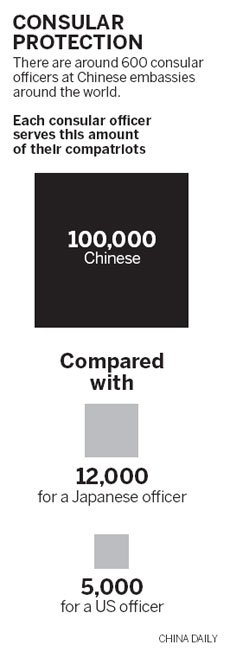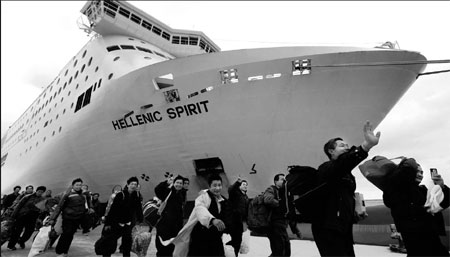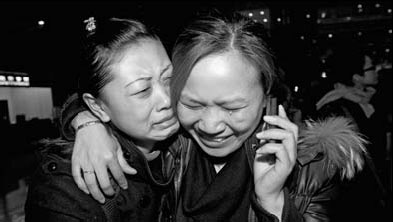Providing protection at all times
Updated: 2011-12-30 08:13
By Qin Zhongwei (China Daily)
|
|||||||||
|
Chinese evacuees queue to board a ship to be evacuated from Benghazi, Libya, in February as the North African country was heading into civil war, which led to the killing of former leader Muammar Gadhafi. Hussein Malla / Associated Press |
|
Two Chinese evacuated from violence-hit Libya weep at Beijing Capital International Airport on Feb 25 after a 10-hour flight from Athens to Beijing. Cui Meng / China Daily |

Chinese consular officials evacuated thousands from crisis zones in 2011
Editor's note: China's consular affairs, highlighted by three successful evacuations of Chinese citizens from overseas in 2011, face uncertainties and new challenges that require government's efforts and increased public awareness in the upcoming year.
Waiting at Beijing International Airport until 3:30 am on Feb 25, Zuo Peng, vice-director of the administration department of China Gezhouba Group Co International, felt relief when he learned that the first chartered flight evacuating Chinese people from war-torn Libya had safely landed and he saw the faces of his colleagues among the passengers at the arrival gate.
More than 300 days have passed since then, but the "tearful but happy reunion" is still engraved in his mind. Zuo was involved in the evacuation work, and 1,060 employees of his group who worked in Libya were part of the largest evacuation of Chinese citizens from abroad since the founding of the People's Republic in 1949.
Ninety-one civil flights, 12 military aircraft, five cargo vessels, one frigate, 35 chartered foreign airplanes, 11 leased foreign ships, and more than 100 buses were used in the evacuation. China immediately mobilized all possible resources soon after political unrest erupted in February to move its citizens from the North African country by air, sea and land routes within only 11 days.
"When thousands of Chinese workers are waiting anxiously at the borders - many of them without passports - the Foreign Ministry and other parts of the government coordinated with great efficiency and immediately dispatched embassy officers to negotiate with customs staff to ensure their safe and prompt evacuation," Zuo told China Daily.
"No one was left behind, and everyone is now safe at home," said Ma Feng, an employee of the group's Libya branch who was among the evacuees.
"It was a very moving moment when we saw the Chinese diplomats holding up national flags, shouting to us, 'We are bringing you home'."
In 2011, China conducted two other major evacuations: from Egypt and earthquake-hit Japan. Together, it safely evacuated about 48,000 Chinese citizens in the three operations.
The figure is unprecedented in the history of China's consular protection, five times the number of people China evacuated in the past 30 years, according to Xia Liping, vice-director of the department of diplomacy at China Foreign Affairs University.
The Foreign Ministry also launched a website in November, which displays bulletins from the department of consular affairs and Chinese embassies overseas. Other technology is employed as well - such as a ministry micro blog and mobile phone texting - to provide contact information for people in need.
Consular protection became a key word in the nation's diplomatic affairs in 2011, largely promoting public understanding about this not-so-familiar term, according to Zhou Qing'an, a professor of public diplomacy at Tsinghua University in Beijing.
"The work of consular protection is like a treadmill that began going very fast this year," he said.
China's consular protection, however, faces uncertainties and challenges, which require government efforts and public awareness to resolve, according to diplomats and scholars.
As the number of Chinese going overseas increases by 30 percent a year, surpassing 61 million in 2010, the need for consular protection surges with it, Zhou said.
There are about 120,000 Chinese students in Britain. Some of them were taken advantage of because they lack social experience, and some were reported missing because they didn't get in touch with their families, according to the Chinese embassy in London.
One of the challenges is the shortage of professionals in consular services.
Le Yucheng, assistant foreign minister, said recently that there are altogether only around 600 consular officers at Chinese embassies around the world, which means one Chinese consular officer has to serve an average of 100,000 overseas citizens - by comparison, a Japanese official serves 12,000 and a US official 5,000.
Meanwhile, non-traditional security threats have become more acute and the cross-boarder activities more frequent, so consular protection must be more institutionalized and needs better coordination between government departments, experts say.
"Especially as financial activities with foreign countries and international trade become more frequent and complicated, it is not realistic to have consular protection work performed only by diplomats and embassies," Zhou said.
While the three evacuations demonstrate the government's success at protecting its overseas citizens and their interests, such an "unconventional approach" is not sustainable experts say.
"Whether China could financially support large-scale evacuations, like the one from Libya, over the long term requires further thought," Xia said.
In addition to the evacuations, there are cases in which Chinese citizens became victims in highly publicized crimes abroad, such as the two Chinese merchant vessels that came under attack on the Mekong River near the Thai-Myanmar border in October, leaving the 13 crewmembers dead.
It is good that public awareness of consular protection abroad is increasing, but enterprises and individuals should be prepared to protect themselves, according to Counselor Song Ronghua of the Ministry's Policy Planning Department.
"We should also have the responsibility to make enterprises and citizens aware of their legal liabilities, local cultures and customs when they are abroad," said Zhu Feng, a professor at Peking University.
During the evacuation from Libya, Zuo's staff from China Gezhouba Group also received assistance from the local tribes and the police, he said.
"It is very important for Chinese enterprises to build up their reputation and gain the trust from the countries that we invest in, which cannot only lift up the image, but also help us in case of emergencies," he said.
Zhang Chunyan in London contributed to this story.
China Daily
(China Daily 12/30/2011 page11)













